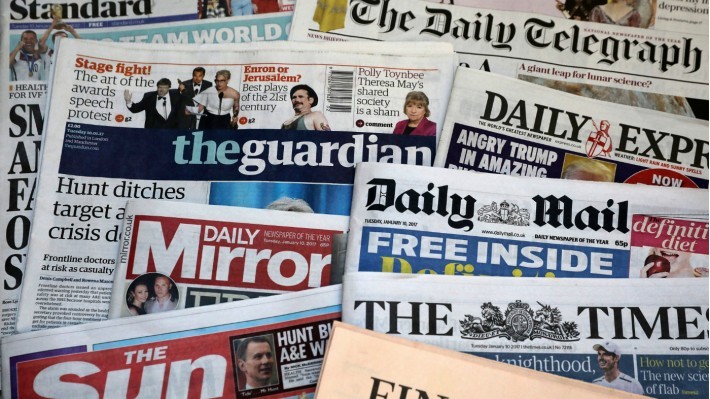How coronavirus could shape the news
Trust in journalists is down as newspapers face funding crisis that could reshape media landscape forever

A free daily email with the biggest news stories of the day – and the best features from TheWeek.com
You are now subscribed
Your newsletter sign-up was successful
Coronavirus risks decimating the media landscape, leaving fewer national and local news outlets to counter the ever-growing problem of fake news and misinformation.
Polls have revealed widespread mistrust at how the mainstream media, and newspapers in particular, have covered the government’s response to the pandemic, but “this is a grim and long-standing issue, [and] it doesn’t mean trust in journalism is suddenly ‘collapsing’ through this crisis, as per the narrative that’s been allowed to take hold,” says Politico.
While journo-bashing has long been a favourite pastime of the British, the longer-term effects of the current crisis look set to have far wider ramifications.
The Week
Escape your echo chamber. Get the facts behind the news, plus analysis from multiple perspectives.

Sign up for The Week's Free Newsletters
From our morning news briefing to a weekly Good News Newsletter, get the best of The Week delivered directly to your inbox.
From our morning news briefing to a weekly Good News Newsletter, get the best of The Week delivered directly to your inbox.
Many media outlets, especially local newspapers, were already struggling before the pandemic struck, “now the virus is taking this crisis to a new level,” writes David Leonhardt in the New York Times.
“The rapid shrinking of the economy — at the fastest pace since the Great Depression — has led to a further decline in advertising. Some newspapers that were on the brink may not survive. And many more journalists have been laid off,” he says.
The Financial Times says Britain’s newspaper industry is facing an “unprecedented crisis”, with national newspaper sales falling by more than a fifth between the middle and end of March, according to data from distributor Smiths News.
Enders Analysis, which forecasts a 50% fall in advertising revenues this year, estimates the total potential cost to the industry at about £650m once circulation declines are included. National newspapers including The Telegraph, the Financial Times and The Guardian have furloughed staff, despite record levels of traffic and engagement from online readers.
A free daily email with the biggest news stories of the day – and the best features from TheWeek.com
–––––––––––––––––––––––––––––––For a round-up of the most important stories from around the world - and a concise, refreshing and balanced take on the week’s news agenda - try The Week magazine. Start your trial subscription today –––––––––––––––––––––––––––––––
Local newspaper groups have been hit particularly hard, with more than 50 titles across Britain no longer appearing in print.
Writing on Medium, Josh Sterns warns of a dangerous knock-on effect, with the erosion in local news tied to a drop in civic engagement, resulting in fewer people running for office, less voting and a rise in polarisation and political corruption.
“Local newspapers are basically little machines that spit out healthier democracies,” Joshua Benton, director of the Nieman Journalism Lab, writes.
“The coronavirus pandemic presents the greatest threat to the global news industry since the 2008 economic crash,” says Press Gazette. “At the same time, our industry has never been more vital. With fake news proliferating on social media, access to quality news and information can be a matter of life and death.”
Amid concerns the sector is struggling to survive the pandemic, the UK government has pledged to bring forward plans to remove value added tax from the sale of digital newspapers.
Until now, digital publications had been charged VAT at 20%. By contrast, physical books and newspapers have been VAT-exempted for decades as governments had considered them a public good.
Yet “if journalism is to be saved as an essential public good a lot more needs to be done – not just by government with public money, but by the technology companies that have benefited from a disfunctional market and by the newspaper industry itself, too” writes Jane Martinson in The Guardian.
“Unless action is swift, the post-Covid media landscape will be a bleak place in which valuable journalism gets lost in a maelstrom of misinformation,” Martinson says. “One where an ‘infodemic’ of anything goes online becomes the eventual norm.”
Elliott Goat is a freelance writer at The Week Digital. A winner of The Independent's Wyn Harness Award, he has been a journalist for over a decade with a focus on human rights, disinformation and elections. He is co-founder and director of Brussels-based investigative NGO Unhack Democracy, which works to support electoral integrity across Europe. A Winston Churchill Memorial Trust Fellow focusing on unions and the Future of Work, Elliott is a founding member of the RSA's Good Work Guild and a contributor to the International State Crime Initiative, an interdisciplinary forum for research, reportage and training on state violence and corruption.